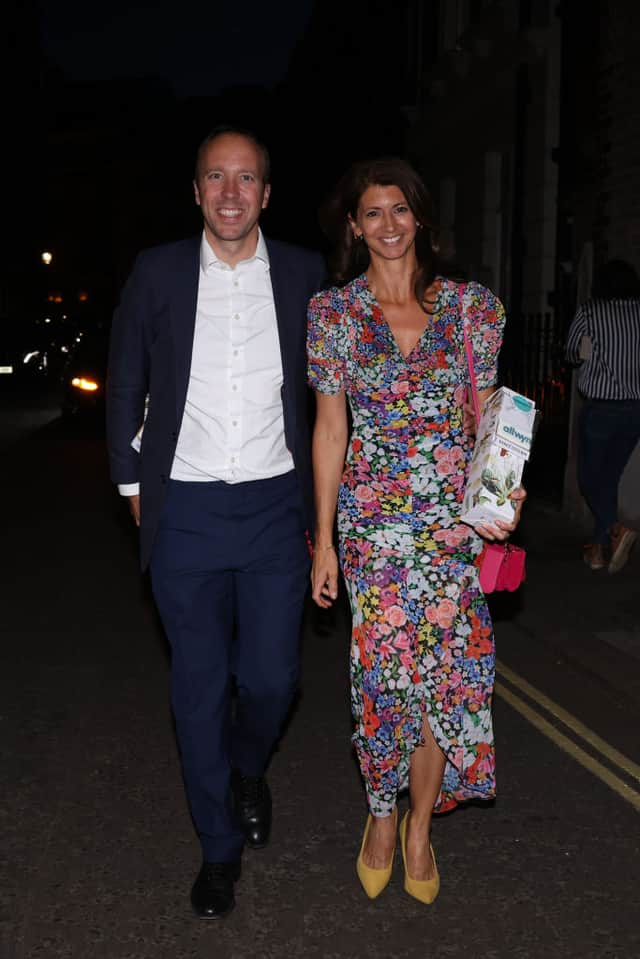Covid Inquiry: Matt Hancock says government should have locked down three weeks earlier to save 'many lives'
and live on Freeview channel 276
The UK should have locked down three weeks earlier at the start of the pandemic, Matt Hancock has told the Covid Inquiry.
The former Health Secretary has said that by 28 February 2020 the government realised that coronavirus "was coming ... that is the moment that we should, with hindsight, have acted". The then-Prime Minister Boris Johnson has been criticised for being too slow to lock down, with the decision taken more than three weeks later on 23 March that year.
Advertisement
Hide AdAdvertisement
Hide AdHancock said: "I defend the actions that were taken by the government at the time, knowing what we did, but with hindsight, that’s the moment should have done it, three weeks, and it would have been would have saved many, many lives."
Giving evidence to the Covid Inquiry today (30 November), Hancock also took aim at both Whitehall and central government for the "incredibly hard" job of getting the government up and running in the months building up to Covid reaching UK shores. He accused others of thinking health officials were "overreacting" and insisted the Department of Health and Social Care (DHSC) was the only one free from the toxic culture that had been established.
DHSC was working "full-time" on Covid-19 from the middle of January, he claimed. "It is natural for the Cabinet Office to be skeptical of departments to hold them to account," he said. "I think the toxic culture you have seen at the centre of government was unhelpful in assuming that when anything was difficult, there was somehow fault and blame. That is part of the toxic culture that we have seen - a lack of generosity and empathy.


"At the start of the pandemic DHSC was trying to wake up Whitehall to this threat, and ended up doing things which aren't really for a health department. One example is shielding the vulnerable [which] was a programme eventually run by the Ministry of Housing, Communities and Local Government (MHCLG). It was about getting groceries to people, getting support from volunteers and looking after those who were most vulnerable. I had to commission the work to get that going.
Advertisement
Hide AdAdvertisement
Hide Ad"The rest of Whitehall was slow to get going - we had to get up there and do it."
Hancock was Health Secretary from 2018 until 2021, when he resigned after he was found to have breached Covid-19 regulations during an affair with DHSC adviser Gina Coladangelo. CCTV images of him kissing and hugging her in Whitehall were published in The Sun newspaper in May that year.
Since then, Hancock has stepped back to focusing on his West Suffolk constituency - while also appearing on TV shows like I'm a Celebrity and Celebrity SAS: Who Dares Wins.
Speaking about the toxic culture in Westminster, he said: "[There was ] an unhealthy toxic culture at the centre. Anything that went wrong was seen as an intentional failure, and worse, among some people misinformation about what the department was delivering was spread - including to the prime minister.
Advertisement
Hide AdAdvertisement
Hide Ad"A healthy culture involves challenge and skepticism; an unhealthy toxic culture instead throws around allegations and extremely unpleasant language.
"You just didn't have that in the health family. I tried to lead a "can-do" culture. That didn't happen all the time, but that was my overall attitude. We rubbed up against this deep unpleasantness at the centre - we were under enormous pressure and enormous stress."
Hancock added that this toxic culture "became a problem" later during the pandemic. When asked which government departments were reluctant to take action, he told the inquiry panel that he "didn't want to point fingers" and did not name any names or departments.
The Inquiry has previously heard about the dysfunctional nature of the No10 operation during the pandemic. Aides described an indecisive Johnson as an out of control trolley careering down an aisle, changing his mind about strategy on a daily basis.
Advertisement
Hide AdAdvertisement
Hide AdHancock also told the Inquiry about the government reaction to the pandemic in the early months of 2020. There was a 10-day period in February - which tied in with half term - when Johnson was on holiday and he was not contacted at all about Covid.
The former Health Secretary says he was told the UK was prepared for a pandemic. He told Johnson's chief adviser Dominic Cummings “we have full plans to roll up to and including pandemic levels regularly prepped and refreshed”. However, in his witness statement Hancock said the only plan in place was a strategy from 2011, described by Inquiry counsel Hugo Keith KC as “a single document, based doctrinally on a completely inappropriate approach”.
Comment Guidelines
National World encourages reader discussion on our stories. User feedback, insights and back-and-forth exchanges add a rich layer of context to reporting. Please review our Community Guidelines before commenting.